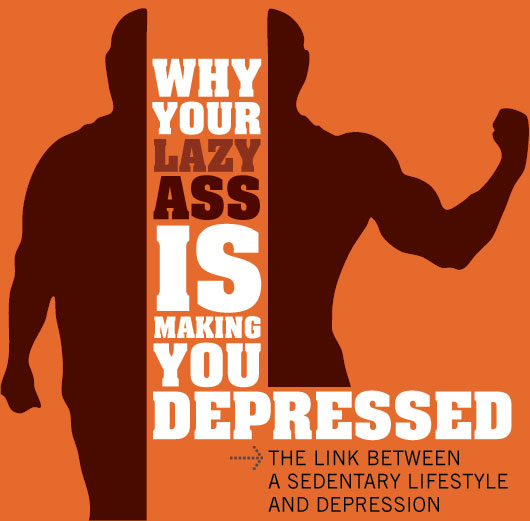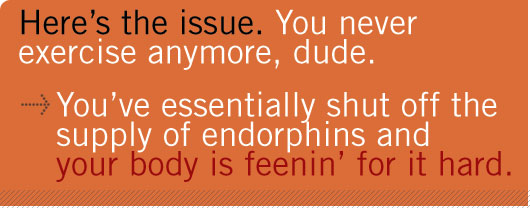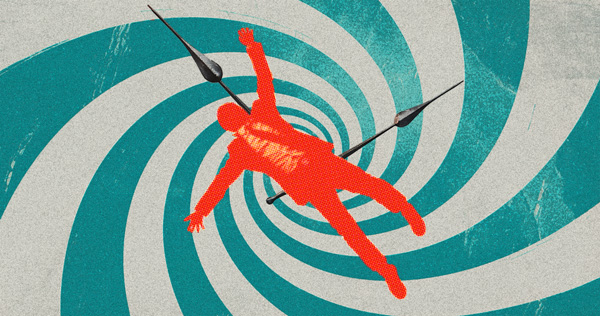Studies spanning back to the 1980s have explored the mood-elevating effects of regular exercise, and ongoing research supports the conclusion that getting your heart pumping can cure mild to moderate depression. You don’t have to be an Olympic runner or spend all day on the treadmill either. A Harvard Health Publications report indicates that a brisk 35 minute walk five days a week or a 60 minute walk three times a week had a “significant influence on mild to moderate depression symptoms.” That means that choosing to hoof it to class or work on Monday, Wednesday and Friday could be all you need to beat the blues.
But why?
Before we get into why exercise is potential cure for depression, let’s talk about what causes depression.
Causes of Depression
The causes of depression aren’t fully understood and they never will be. There are numerous external factors that can lead to depression, from trauma and substance abuse to unresolved grief or anxiety. But the biological mechanisms of depression all look surprisingly similar on a neurochemical level. It has something to do with a substance called serotonin.
Serotonin, as you may know, is a neurotransmitter that plays an important role in regulating your moods. The key part of that fancy word is “-transmitter.” Serotonin is the messenger that delivers that good news to your brain that it’s time to feel happy, calm or satisfied. The serotonin receptors are supposed to get that message and pass it along to your brain. But if those receptors are busted or deficient for any reason, then the message doesn’t get passed along, or only part of it gets passed along.
So, basically, it’s like your brain didn’t get the memo that there’s no reason to feel down in the dumps. That’s depression in a very unscientific, oversimplified nutshell.
One of the ways to fix this imbalance is through antidepressants.
How Do Antidepressants Work?
Most antidepressants – e.g. Zoloft, Prozac, Paxil – are of the selective serotonin reuptake inhibitor (SSRI) class. What the heck is a selective serotonin reuptake inhibitor, and why would that cure depression? There’s an extensive Wikipediaentry on SSRIs that may be illuminating for those who care about the neurobiological nitty gritty, but for the purposes of this article, all you need to know is the following:
- Serotonin, as mentioned above, is a neurotransmitter that relays certain mood pertinent signals to your brain’s receptors.
- “Reuptake” is when your brain “cleans up” neurotransmitters that have already delivered their message and are just laying around. That’s because as long as those neurotransmitters are there, they keep relaying their message.
- Anti-depressants inhibit this reuptake process so more serotonin accumulates and thus relays a stronger message to certain receptors.
In short, antidepressants are believed to work because they boost the supply of serotonin. For many men and women, antidepressants do the trick. But there are side effects. The most troubling to you as an intrepid young man, perhaps, are the potential adverse sexual side effects. SSRIs in some people can cause impotence, decreased or absent libido, anorgasmia (inability to achieve orgasm) and genital anesthesia (exactly what it sounds like). These side effects can occur while you are on antidepressants but can continue even after stop. Plus, SSRIs have dependence producing effects, meaning going off of them can trigger withdrawal symptoms.
You might want to remember that scene from “A Beautiful Mind” when Russell Crowe is lying in bed and his frisky wife is trying to get him in the mood. He ends up morosely turning her away, explaining that “it’s the medication.” In the movie, he’s on anti-psychotics, but the takeaway is the same: If your pills sap away your mojo so severely that it causes you to reject the advances of Jennifer Connelly, then it’s probably worth exploring an alternative.
Your Body’s Natural Pharmacy
So, we’ve already determined that you need more serotonin in your life. The problem with the serotonin we can get from the pharmacist is that it’s a blunt instrument with plenty of collateral damage, as we established above. The good news is that you don’t have to outsource your serotonin.
As Tor Wager, an assistant professor of psychology at Columbia University, explained to Jad Abumrad on an episode of Radiolab:
Every drug out there is in the world, every single one, even the ones you see on TV, are, in a sense, already inside our heads. “Your brain must have its own internal chemical.” The only reason those drugs work, he says, is our brain has receptors for them. And why would it have those receptors? Because it can already make them in-house.
“Every pharmacological agent or drug that there is. You know there is a chemical it's produced by your own brain that essentially that does that same thing.” Like an internal pharmacy in there, just stocked full of drugs. We just have to figure out how to unlock it.
One of the most important keys to unlocking that internal pharmacy is exercise. When you exercise, your body releases endorphins – your body’s natural “feel good” neurotransmitters. Endorphins are “endogenous opioid peptides,” the key word there being opioid. That’s right, opioids as in opium–the world’s most powerful painkiller. I guess that’s why they call it a “runner’shigh.”
Which leads us to our next revelation…
Your Sedentary Lifestyle is Bumming You Out
Here’s the issue. You never exercise anymore, dude. You spend eight hours a day sitting in an office. Then, you spend two hours a day sitting in your car on the turnpike. Then, you get home and collapse on the couch in front of the Xbox. You’ve essentially shut off the supply of endorphins and your body is feenin’ for it hard. It's not natural.
So, before you give up hope, try this:
Make sure you get at least 35 minutes of exercise each day. It doesn’t have to be anything strenuous or overly regimented. It could be as simple as playing a game of ultimate frisbee twice a week or prioritizing chores that require some physical activity, such as washing the car, mowing the lawn or organizing boxes in the attic. It’s also important to move around throughout the day. Get away from your desk at least once every few hours, walk around the block or take the stairs before and after lunch. (Watch a CrashCourseinBeatingtheCubicleTrap for more ideas.)
Beyond Biology
Like I said, you don’t have to join a gym to get the emotional benefits of exercise. But it might be a good idea to start a routine of jogging or working out. In Western society, this is the closest that most of us get to meditating. It allows us to be alone with our thoughts without descending into a ruminative state.
Beyond the serotonin deficiencies, symptoms of depression like anxiety, loss of energy and short temper can be due to unresolved issues that lurk in the back of your consciousness without being processed properly. You can use your 30-minute jog to mull over all those things that you’ve been too distracted to consider and come back feeling more at peace. That doesn’t mean that you’re going to find solutions for all your vexing decisions and emotional challenges while you’re out for a jog. But it does give you time to be more self-aware and centered in the same way that meditation might. (More on the link between depressionandmeditation.)
The bottom-line is that humans were never meant to live their lives inside little boxes staring at little screens all day. And while an hour of Call of Duty or a shouting match with your supervisor may get your heart pumping, it’s nowhere near the same as walking twenty city blocks or shooting some hoops with some friends.
Maybe after another millennium of evolution, our bodies will be able to feel good about a sedentary lifestyle, but for now, you have to treat your body like a piece of legacy hardware. It needs its sweet, sweet endorphins or it’s going to get cranky. Give it what it wants. Get off your butt and get your blood pumping.
(With all that being said, those suffering from serious psychological or mental disorders should consult a doctor and follow their instructions. Stepping away from the computer desk for 35 minutes a day will only address a depressed mood caused by a sedentary lifestyle. There are real issues medication may be the best option for, only your doctor can tell you what's right for you.)

















